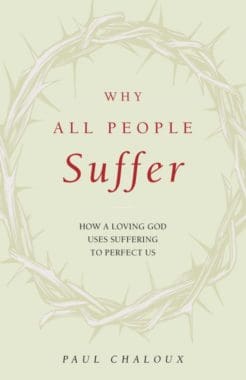Joy is our ability to sense spiritual attainment, the carrot to the stick of suffering, which guides us home along the path of righteousness as surely as a beacon in a stormy harbor. At the beginning of our spiritual journey, it can be hard to see the joy; particularly when we are experiencing suffering as God guides us toward His plan for us. However, as we proceed through the four tasks of suffering, learning to love, while at the same time learning of God’s love for us, our suffering begins to take on meaning. In the very first paragraph of Salvifici doloris, St. John Paul II asserts that when St. Paul declared to the Colossians, “Now I rejoice in my sufferings for your sake,” his joy came from the discovery of the meaning of suffering.532 In a very real way, this is the basis for the entire apostolic letter, a work that the pope completed shortly after his recovery from an assassination attempt. Later in the document, perhaps speaking of his own personal experience, St. John Paul II writes: “It is when the salvific meaning of suffering descends to man’s level and becomes the individual’s personal response that man finds in his suffering interior peace and even spiritual joy.”
Nor is St. John Paul II the only one to recognize that understanding the meaning of suffering can relieve it. Simone Weil, writing a half-century earlier, declared that “Only through contemplating Jesus on the cross in affliction and recognizing our solidarity with him in denying ourselves can affliction be relieved.” Speaking from a medical perspective, Eric Cassell notes that “Transcendence brings relief to the pain and deprivation—to the suffering itself—by giving it a meaning larger than the person.”
The ultimate message of the theology of suffering is one that provides the perspective that God loves us as only the Creator of the Universe could. He made us from dust and sustains us with every breath we take. He knows what is best for us but respects us enough to let us make our own choices. However, He does not leave us unaided or unattended. He sent Jesus to show us how to fulfill our destiny, and He gave us suffering to warn us when we leave the path that leads us to true happiness in His presence. He builds us up as an ecclesial community, providing the grace of the sacraments while calling on us to share our experiences with each other and to act in love to alleviate the suffering of our neighbors, just as the Good Samaritan did in Jesus’ parable. In this way, the unity of the Church prefigures our ultimate union with God. The fact that suffering is uncomfortable and relentless when we deviate from the good is a sign of His mercy and love; it needs to be that way to motivate us to turn away from our vices because we are creatures of habit.
Understood properly, suffering gives us hope both for the Beatific Vision and the motivation to attain it. This perspective leads to joy and is consistent with the rest of the Christian message based on the love and mercy of God and is therefore credible. It allows us to dismiss the view of suffering as the wrathful action of a vengeful God as an unfortunate interpretation of the facts based on a perspective limited to the physical world. There can also be joy in the knowledge that those who suffer are not guilty or whiners, as some would suppose, but are messengers of God’s glory, called to share what they experience for the edification and salvation of their fellow humans.
There are two important reasons as to why there is joy in finding meaning in suffering. The first, unmentioned by any of the commentators, is to recognize that God wants us to share in His life every bit as much as the father desired to share his life with the Prodigal Son in Jesus’ parable. The realization that God has provided humans with the ability to sense whenever they stray from the path He set out for their happiness and fulfillment is a huge cause for joy. There should be great joy in the realization that suffering is God leading us home like a divine beacon, highlighting all obstacles that would keep us from His love, rather than an act of spite as sometimes claimed by society.
As described by St. John Paul II and other commentators, the second reason for joy is that our suffering has purpose when it is united to that of Christ and that it can lead to eternal life in the blissful presence of God, both for the sufferer and
the person who aids him. In fact, it is joyful that God the Son deemed us worthy of emptying Himself and coming as the man Jesus to demonstrate how humans can love in a way that leads to eternal life, even dying on the Cross to show the unlimited nature of His love. We should rejoice in our ability to follow His example when we suffer for the benefit of others, and we should most assuredly rejoice when we understand that those who share in His suffering will also share in His glory.538
+
This article is adapted from a chapter in Why All People Suffer by Dr. Paul Chaloux, which is available from Sophia Institute Press.
Art for this post: Cover and featured image used with permission.






